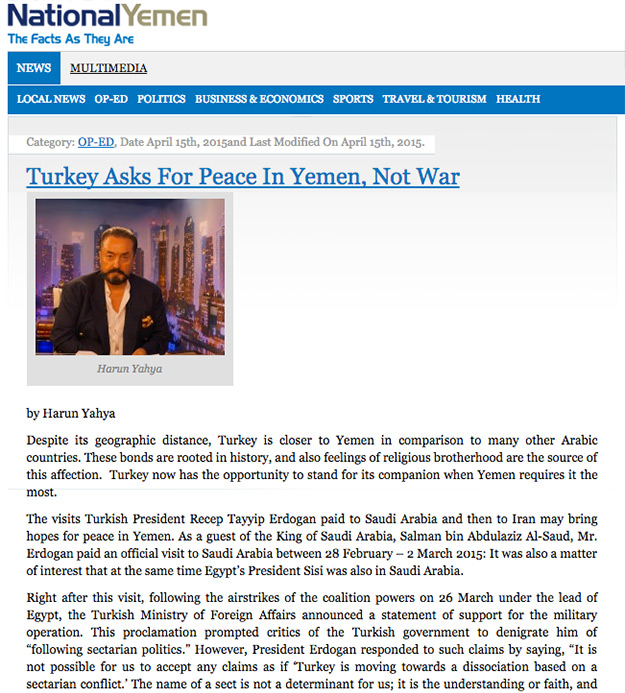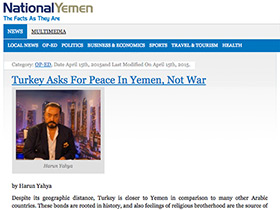
Despite its geographic distance, Turkey is closer to Yemen in comparison to many other Arabic countries. These bonds are rooted in history, and also feelings of religious brotherhood are the source of this affection. Turkey now has the opportunity to stand for its companion when Yemen requires it the most.
The visits Turkish President Recep Tayyip Erdogan paid to Saudi Arabia and then to Iran may bring hopes for peace in Yemen. As a guest of the King of Saudi Arabia, Salman bin Abdulaziz Al-Saud, Mr. Erdogan paid an official visit to Saudi Arabia between 28 February – 2 March 2015: It was also a matter of interest that at the same time Egypt’s President Sisi was also in Saudi Arabia.
Right after this visit, following the airstrikes of the coalition powers on 26 March under the lead of Egypt, the Turkish Ministry of Foreign Affairs announced a statement of support for the military operation. This proclamation prompted critics of the Turkish government to denigrate him of “following sectarian politics.” However, President Erdogan responded to such claims by saying, “It is not possible for us to accept any claims as if ‘Turkey is moving towards a dissociation based on a sectarian conflict.’ The name of a sect is not a determinant for us; it is the understanding or faith, and the truth of Islam. Some could follow the Shia, and in my country there could be a majority of Sunni… Yet, in relation to faith, it is neither the Sunni, nor the Shia that would direct our future. What is essential is Islam.” (1)
President Erdogan made a similar statement in Iran. This visit was planned long before the operation. Although Iran disagreed with Turkey because of her advocacy of the operation, during his joint conference with Iranian President Rouhani, President Erdogan emphasized the obligation to end the bloodshed and terminate dissociations in relation to the incidents in Iraq – Syria and Yemen:
“Neither the Shia, nor the Sunni is a matter of concern; what is of significance is being a Muslim. Man is the most honorable creature. We need to sit and talk, and find a way to end this murder. Let us reconcile the ones who are in confrontation.” (2)
If we are to reflect on the conduct of Ankara today, we obviously see that Turkey is not on the side of war, but of peace in Yemen. Turkey is actively utilizing its close relations with both Iran and Saudi Arabia for the settlement of peace in Yemen. As a matter of fact, in a joint press conference with the Turkish Minister of Foreign Affairs, Mevlut Cavusoglu and his Sudanese counterpart, Ali Ahmed Karti, noted this effort. The Minister of Foreign Affairs, made the following statement:
“There is a fire in Yemen. We need to put out this fire. There are countries responsible for the current state of affairs in Yemen. We blatantly brought this on the agenda in Tehran. We believe that this issue in Yemen may be rectified through political dialogue and resolution, and countries such as Turkey, Iran and Saudi Arabia should play a significant role in sorting out this matter. We are in agreement with Iran on the basis of cooperation to that end. Now, we are in contact with Gulf countries and will pursue our intercourse. We are already in dialogue with Zarif on every opportunity and will be in closer contact in the coming term. Likewise, we will undertake this correspondence with Gulf countries and Arabic states.” (3)
Could Turkey really be an intermediate for peace in Yemen?
Looking at the Middle East, Turkey stands out as one of the key actors of the region. Eight years ago Turkey was influential in bringing Israel and Syria to the peace table, yet peace was interrupted at the last minute due to Israel’s Lebanon operation at the time. Alon Liel, Israel’s former ambassador to Ankara, explained in detail in Haaretz Daily the effort Turkey made for peacemaking. (4)
Another example for Turkey’s peacemaking efforts in the Middle East includes Syria. When unrest against Assad began, Turkey did not come out against Assad at once, but made a sincere effort to establish peace. She advised Assad to democratize and stabilize Syria. Additionally Turkey has preached a lesson of peace and compassion to the world by hosting on her territory 1.6 million refugees without discriminating regarding religion or ethnic identity. This stance of Turkey is a significant indicator of the fact that Turkey’s foreign policy regarding the Middle East does not rely on ethnic or religious discrimination.
Turkey had previously pursued a similar effort for Palestine and Lebanon. Though she consists of a major Sunni population, the fact that she has friendly relations with Iran strengthens her position regarding Yemen. When Iran was pressured by the whole world to end the nuclear project she was developing, Turkey and Brazil proposed an important suggestion for a solution.
Furthermore, Turkey becomes a significant hope for Yemen when all this experience and her relations with the region are taken into consideration. If Turkey procures a lasting peace in Yemen by siding with Iran and Saudi Arabia, this would be a great success for the region. The next step would be to provide permanent stability and initiate a recovery progress in Yemen. For this to be possible, Muslims in Iran, Saudi Arabia and Yemen must remember that they are brothers and put aside any sectarian enmity.
Indeed it is highly significant that Turkey refrains from contributing to the bloodshed of Muslims everywhere in the world and focuses on love, understanding, dialog and diplomacy. The fact that solutions are being sought in brotherhood should bring hope not only to Yemen, but also to the entire Middle East.
Refences:
(1) http://www.haberturk.com/gundem/haber/1063709-baskanliga-335-de-yeter
(2) http://www.haber7.com/dis-politika/haber/1339747-erdogan-beni-ne-sia-ne-sunni-ilgilendirir
(3) http://www.aljazeera.com.tr/haber/cavusoglu-iranla-isbirligi-artacak
(4) http://www.bbc.co.uk/turkish/news/story/2007/01/070116_syria_israel_tr.shtml
Adnan Oktar's piece on National Yemen:


